- Home
- Tom Stoppard
Rosencrantz and Guildenstern are dead. Arcadia Page 11
Rosencrantz and Guildenstern are dead. Arcadia Read online
Page 11
hannah: You teach?
Bernard: Yes. And write, like you, like we all, though I've never done anything which has sold like Caro.
hannah: I don't teach.
Bernard: No. All the more credit to you. To rehabilitate a
20
forgotten writer, I suppose you could say that's the main
reason for an English don. hannah: Not to teach? BERNARD: Good God, no, let the brats sort it out for themselves.
Anyway, many congratulations. I expect someone will be
bringing out Caroline Lamb's oeuvre now? hannah: Yes, I expect so. Bernard: How wonderful! Bravo! Simply as a document
shedding reflected light on the character of Lord Byron, it's
bound to be -hannah: Bernard. You did say Bernard, didn't you? BERNARD: I did.
hannah: I'm putting my shoes on again. Bernard: Oh. You're not going to go out? hannah: No, I'm going to kick you in the balls. Bernard: Right. Point taken. Ezra Chater. hannah: Ezra Chater. BERNARD: Born Twickenham, Middlesex, 1778, author of two
verse narratives, 'The Maid of Turkey', 1808, and 'The
Couch of Eros', 1809. Nothing known after 1809, disappears
from view. hannah: I see. And? BERNARD: (Reaching for his bag) There is a Sidley Park
connection.
(He produces 'The Couch of Eros'from the bag. He reads the
inscription.)
To my friend Septimus Hodge, who stood up and gave his
best on behalf of the Author - Ezra Chater, at Sidley Park,
Derbyshire, April 10th 1809.
(He gives her the book.)
I am in your hands. hannah: The Couch of Eros'. Is it any good? Bernard: Quite surprising. hannah: You think there's a book in him? BERNARD: No, no - a monograph perhaps for the Journal of
English Studies. There's almost nothing on Chater, not a
word in the DNB, of course - by that time he'd been
completely forgotten.
21
hannah: Family?
Bernard: Zilch. There's only one other Chater in the British
Library database. hannah: Same period? Bernard: Yes, but he wasn't a poet like our Ezra, he was a
botanist who described a dwarf dahlia in Martinique and
died there after being bitten by a monkey. hannah: And Ezra Chater? Bernard: He gets two references in the periodical index, one for each
book, in both cases a substantial review in the Piccadilly Recreation, a
thrice weekly folio sheet, but giving no personal details. hannah: And where was this (the book)? Bernard: Private collection. I've got a talk to give next week, in
London, and I think Chater is interesting, so anything on
him, or this Septimus Hodge, Sidley Park, any leads at all
... I'd be most grateful.
(Pause.) hannah: Well! This is a new experience for me. A grovelling
academic. Bernard: Oh, I say. hannah: Oh, but it is. All the academics who reviewed my book
patronized it. Bernard: Surely not. hannah: Surely yes. The Byron gang unzipped their flies and
patronized all over it. Where is it you don't bother to teach,
by the way? Bernard: Oh, well, Sussex, actually. hannah: Sussex. (She thinks a moment.) Nightingale. Yes; a
thousand words in the Observer to see me off the premises
with a pat on the bottom. You must know him. Bernard: As I say, I'm in your hands. hannah: Quite. Say please, then. Bernard: Please. hannah: Sit down, do. Bernard: Thank you.
(He takes a chair. She remains standing. Possibly she smokes; if
so, perhaps now. A short cigarette-holder sounds right, too. Or
brown-paper cigarillos.)
22
hannah: How did you know I was here?
Bernard: Oh, I didn't. I spoke to the son on the phone but he
didn't mention you by name . . . and then he forgot to
mention me. hannah: Valentine. He's at Oxford, technically. Bernard: Yes, I met him. Brideshead Regurgitated. hannah: My fiance.
(She holds his look.) Bernard: (Pause) I'll take a chance. You're lying. hannah: (Pause) Well done, Bernard. Bernard: Christ. hannah: He calls me his fiancee. Bernard: Why? hannah: It's a joke. Bernard: You turned him down?
hannah: Don't be silly, do I look like the next Countess of-BERNARD: No, no - a freebie. The joke that consoles. My tortoise
Lightning, my fiancee Hannah. hannah: Oh. Yes. You have a way with you, Bernard. I'm not
sure I like it. Bernard: What's he doing, Valentine? hannah: He's a postgrad. Biology. Bernard: No, he's a mathematician. hannah: Well, he's doing grouse. Bernard: Grouse?
hannah: Not actual grouse. Computer grouse. Bernard: Who's the one who doesn't speak?
HANNAH: GUS.
Bernard: What's the matter with him?
hannah: I didn't ask.
BERNARD: And the father sounds like a lot of fun.
hannah: Ah yes.
Bernard: And the mother is the gardener. What's going on
here? hannah: What do you mean? Bernard: I nearly took her head off- she was standing in a
trench at the time. hannah: Archaeology. The house had a formal Italian garden
23
until about 1740. Lady Croom is interested in garden history. I sent her my book - it contains, as you know if you've read it - which I'm not assuming, by the way - a rather good description of Caroline's garden at Brocket Hall. I'm here now helping Hermione.
Bernard: (Impressed) Hermione.
HANNAH: The records are unusually complete and they have never been worked on.
Bernard: I'm beginning to admire you.
Hannah: Before was bullshit?
Bernard: Completely. Your photograph does you justice, I'm not sure the book does. (She considers him. He waits, confident.)
hannah: Septimus Hodge was the tutor.
Bernard: (Quietly) Attagirl.
hannah: His pupil was the Croom daughter. There was a son at Eton. Septimus lived in the house: the pay book specifies allowances for wine and candles. So, not quite a guest but rather more than a steward. His letter of self-recommendation is preserved among the papers. I'll dig it out for you. As far as I remember he studied mathematics and natural philosophy at Cambridge. A scientist, therefore, as much as anything.
Bernard: I'm impressed. Thank you. And Chater?
hannah: Nothing.
Bernard: Oh. Nothing at all?
hannah: I'm afraid not.
Bernard: How about the library?
hannah: The catalogue was done in the 1880s. I've been through the lot.
Bernard: Books or catalogue?
hannah: Catalogue.
BERNARD: Ah. Pity.
hannah: I'm sorry.
Bernard: What about the letters? No mention?
hannah: I'm afraid not. I've been very thorough in your period because, of course, it's my period too.
BERNARD: Is it? Actually, I don't quite know what it is you're . . .
24
hannah: The Sidley hermit.
Bernard: Ah. Who's he?
hannah: He's my peg for the nervous breakdown of the Romantic
Imagination. I'm doing landscape and literature 1750 to 1834. Bernard: What happened in 1834? hannah: My hermit died. BERNARD: Of course. hannah: What do you mean, of course? BERNARD: Nothing. hannah: Yes, you do.
Bernard: No, no... However, Coleridge also died in 1834. hannah: So he did. What a stroke of luck. (Softening.) Thank
you, Bernard.
(She goes to the reading stand and opens Noakes's sketch book.)
Look-there he is.
(BERNARDgoes to look.)
Bernard: Mmm.
hannah: The only known likeness of the Sidley hermit.
Bernard: Very biblical.
hannah: Drawn in by a later hand, of course. The hermitage didn't yet exist when Noakes did the drawings.
Bernard: Noakes. . . the painter?
hannah: Lands
cape gardener. He'd do these books for his clients, as a sort of prospectus. (She demonstrates.) Before and after, you see. This is how it all looked until, say, 1810 - smooth, undulating, serpentine - open water, clumps of trees, classical boat-house -
Bernard: Lovely. The real England.
hannah: You can stop being silly now, Bernard. English landscape was invented by gardeners imitating foreign painters who were evoking classical authors. The whole thing was brought home in the luggage from the grand tour. Here, look - Capability Brown doing Claude, who was doing Virgil. Arcadia! And here, superimposed by Richard Noakes, untamed nature in the style of Salvator Rosa. It's the Gothic novel expressed in landscape. Everything but vampires. There's an account of my hermit in a letter by your illustrious namesake,
25
BERNARD: Florence?
hannah: What?
Bernard: No. You go on.
hannah: Thomas Love Peacock.
Bernard: Ah yes.
hannah: I found it in an essay on hermits and anchorites
published in the CornhillMagazine in the 186os. . . {She fishes for the magazine itself among the books on the table, and finds it.) . . . 1862 . . . Peacock calls him {S he quotes from memory.) 'Not one of your village simpletons to frighten the ladies, but a savant among idiots, a sage of lunacy.'
Bernard: An oxy-moron, so to speak.
hannah: {Busy) Yes. What?
BERNARD: Nothing.
hannah: {Having found the place) Here we are. 'A letter we have seen, written by the author of Headlong Hall nearly thirty years ago, tells of a visit to the Earl of Croom's estate, Sidley Park -'
BERNARD: Was the letter to Thackeray?
HANNAH: {Brought up short) I don't know. Does it matter?
Bernard: No. Sorry.
{But the gaps he leaves for her are false promises - and she is not
quick enough. Thaf show it goes.)
Only, Thackeray edited the Cornhill until '63 when, as you
know, he died. His father had been with the East India
Company where Peacock, of course, had held the position of
Examiner, so it's quite possible that if the essay were by
Thackeray, the letter. . . Sorry. Go on.
Of course, the East India Library in Blackfriars has most of
Peacock's letters, so it would be quite easy to . . . Sorry. Can I
look?
{Silently she hands him the Cornhill.)
Yes, it's been topped and tailed, of course. It might be worth . . .
Goon. I'm listening . . .
{Leafing through the essay, he suddenly chuckles.) Oh yes, it's
Thackeray all right. . .
{He slaps the book shut.) Unbearable . . .
{He hands it back to her.) What were you saying?
hannah: Are you always like this?
26
BERNARD: Like what?
HANNAH: The point is, the Crooms, of course, had the hermit under their noses for twenty years so hardly thought him worth remarking. As I'm finding out. The Peacock letter is still the main source, unfortunately. When I read this (the magazine in her hand) well, it was one of those moments that tell you what your next book is going to be. The hermit of Sidley Park was my ...
Bernard: Peg.
hannah: Epiphany.
Bernard: Epiphany, that's it.
hannah: The hermit was placed in the landscape exactly as one might place a pottery gnome. And there he lived out his life as a garden ornament.
Bernard: Did he do anything?
hannah: Oh, he was very busy. When he died, the cottage was stacked solid with paper. Hundreds of pages. Thousands. Peacock says he was suspected of genius. It turned out, of course, he was off his head. He'd covered every sheet with cabalistic proofs that the world was coming to an end. It's perfect, isn't it? A perfect symbol, I mean.
Bernard: Oh, yes. Of what?
hannah: The whole Romantic sham, Bernard! It's what happened to the Enlightenment, isn't it? A century of intellectual rigour turned in on itself. A mind in chaos suspected of genius. In a setting of cheap thrills and false emotion. The history of the garden says it all, beautifully. There's an engraving of Sidley Park in 1730 that makes you want to weep. Paradise in the age of reason. By 1760 everything had gone - the topiary, pools and terraces, fountains, an avenue of limes - the whole sublime geometry was ploughed under by Capability Brown. The grass went from the doorstep to the horizon and the best box hedge in Derbyshire was dug up for the ha-ha so that the fools could pretend they were living in God's countryside. And then Richard Noakes came in to bring God up to date. By the time he'd finished it looked like this (the sketch book). The decline from thinking to feeling, you see.
27
Bernard: {A judgement) That's awfully good.
(HANNAH looks at him in case of irony but he is professional.)
No, that'll stand up. hannah: Thank you.
BERNARD: Personally I like the ha-ha. Do you like hedges? hannah: I don't like sentimentality. Bernard: Yes, I see. Are you sure? You seem quite sentimental
over geometry. But the hermit is very very good. The
genius of the place. hannah: (Pleased) That's my title! Bernard: Of course. hannah: (Less pleased) Of course? Bernard: Of course. Who was he when he wasn't being a
symbol? hannah: I don't know.
BERNARD: Ah.
hannah: I mean, yet.
Bernard: Absolutely. What did they do with all the paper?
Does Peacock say? hannah: Made a bonfire. Bernard: Ah, well. hannah: I've still got Lady Croom's garden books to go
through. Bernard: Account books or journals? hannah: A bit of both. They're gappy but they span the
period. hannah: Really? Have you come across Byron at all? As a
matter of interest. hannah: A first edition of 'Childe Harold' in the library, and
English Bards, I think. Bernard: Inscribed? hannah: No.
BERNARD: And he doesn't pop up in the letters at all? hannah: Why should he? The Crooms don't pop up in his. BERNARD: (Casually) That's true, of course. But Newstead isn't
so far away. Would you mind terribly if I poked about a
bit? Only in the papers you've done with, of course.
(hannah twigs something.)
28
Hannah: Are you looking into Byron or Chater?
(chloE enters in stockinged feet through one of the side doors?
laden with an armful of generally similar leather-covered ledgers.
She detours to collect her shoes.) CHLOE: Sorry - just cutting through - there's tea in the pantry if
you don't mind mugs -Bernard: How kind. chloE: Hannah will show you. BERNARD: Let me help you. chloE: No, it's all right -
(BERNARD opens the opposite door for her.)
Thank you - I've been saving Val's game books. Thanks.
(BERNARD closes the door.) Bernard: Sweet girl. hannah: Mmm. Bernard: Oh, really? hannah: Oh really what?
(CHLOfi's door opens again and she puts her head round it.) chloE: Meant to say, don't worry if father makes remarks about
your car, Mr Nightingale, he's got a thing about - (and the
Nightingale now being out of the bag) ooh - ah, how was the
surprise? - not yet, eh? Oh, well - sorry - tea, anyway - so
sorry if I - (Embarrassed, she leaves again, closing the door.
Pause.) hannah: You absolute shit.
(She heads off to leave.) Bernard: The thing is, there's a Byron connection too.
(HANNAH stops andfaces him.) hannah: I don't care. Bernard: You should. The Byron gang are going to get their
dicks caught in their zip. hannah: (Pause) Oh really? Bernard: If we collaborate. hannah: On what? Bernard: Sit down, I'll tell you. hannah: I'll stand for the moment. Bernard: This copy of The Couch of Eros' belonged to Lord
Byron.
29
HANNAH: It belonged to Septimus Hodge.
Bernard: Originally, yes. But it was in
Byron's library which was sold to pay his debts when he left England for good in 1816. The sales catalogue is in the British Library. 'Eros' was lot 74A and was bought by the bookseller and publisher John Nightingale of Opera Court, Pall Mall. . . whose name survives in the firm of Nightingale and Matlock, the present Nightingale being my cousin. (He pauses. H ANN ah hesitates and then sits down at the table.) I'll just give you the headlines. 1939, stock removed to Nightingale country house in Kent. 1945, stock returned to bookshop. Meanwhile, overlooked box of early nineteenth-century books languish in country house cellar until house sold to make way for the Channel Tunnel rail-link. 'Eros' discovered with sales slip from 1816 attached - photocopy available for inspection.
(He brings this from his bag and gives it to HANNAH who inspects it.)
HANNAH: All right. It was in Byron's library.
Bernard: A number of passages have been underlined. (HANNAH picks up the book and leafs through it.) All of them, and only them - no, no, look at me, not at the book - all the underlined passages, word for word, were used as quotations in the review of 'The Couch of Eros' in the Piccadilly Recreation of April 30th 1809. The reviewer begins by drawing attention to his previous notice in the same periodical of 'The Maid of Turkey'.
hannah: The reviewer is obviously Hodge. 'My friend
Septimus Hodge who stood up and gave his best on behalf of the Author.'
Bernard: That's the point. The Piccadilly ridiculed both books.
HANNAH: (Pause.) Do the reviews read like Byron?
Bernard: (Producing two photocopies from his case) They read a damn sight more like Byron than Byron's review of Wordsworth the previous year. (HANNAH glances over the photocopies.)
HANNAH: I see. Well, congratulations. Possibly. Two previously
30
unknown book reviews by the young Byron. Is that it? Bernard: No. Because of the tapes, three documents survived undisturbed in the book.
(He has been carefully opening a package produced from his bag. He has the originals. He holds them carefully one by one.) 'Sir - we have a matter to settle. I wait on you in the gun room. E. Chater, Esq.'
'My husband has sent to town for pistols. Deny what cannot be proven - for Charity's sake -1 keep my room this day.' Unsigned.
'Sidley Park, April nth 1809. Sir -1 call you a liar, a lecher, a slanderer in the press and a thief of my honour. I wait upon your arrangements for giving me satisfaction as a man and a poet. E. Chater, Esq.'

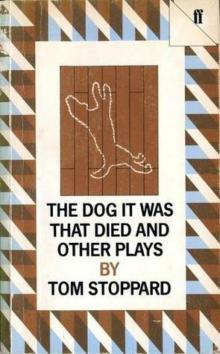 The Dog It Was That Died and Other Plays
The Dog It Was That Died and Other Plays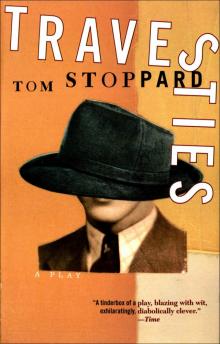 Travesties
Travesties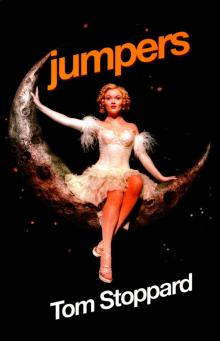 Jumpers
Jumpers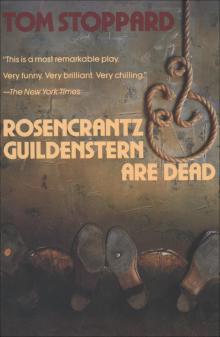 Rosencrantz and Guildenstern Are Dead
Rosencrantz and Guildenstern Are Dead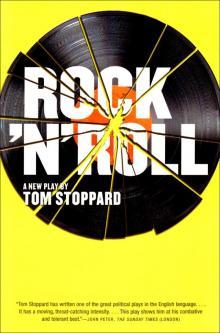 Rock 'N' Roll
Rock 'N' Roll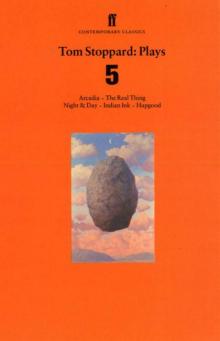 Plays 5
Plays 5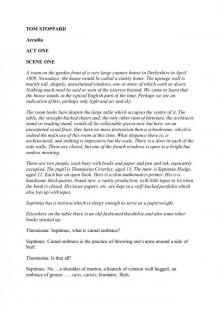 Arcadia
Arcadia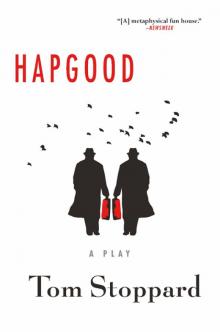 Hapgood
Hapgood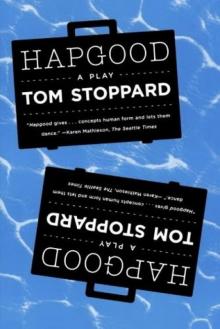 Hapgood: A Play
Hapgood: A Play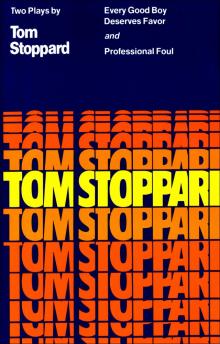 Every Good Boy Deserves Favor & Professional Foul
Every Good Boy Deserves Favor & Professional Foul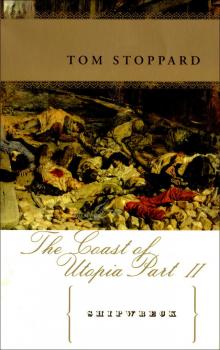 The Coast of Utopia: Voyage, Shipwreck, Salvage
The Coast of Utopia: Voyage, Shipwreck, Salvage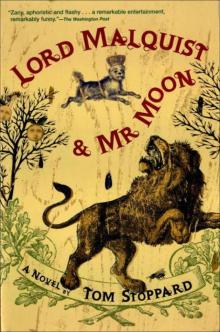 Lord Malquist & Mr. Moon
Lord Malquist & Mr. Moon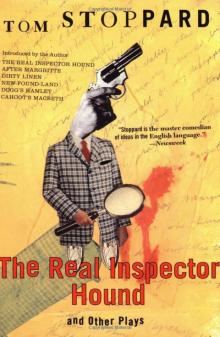 The Real Inspector Hound and Other Plays
The Real Inspector Hound and Other Plays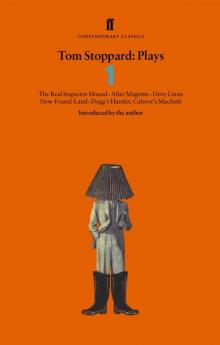 Tom Stoppard Plays 1
Tom Stoppard Plays 1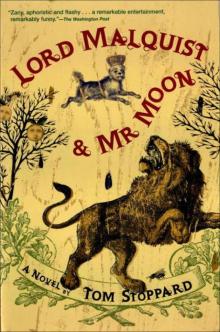 Lord Malquist & Mr. Moon: A Novel
Lord Malquist & Mr. Moon: A Novel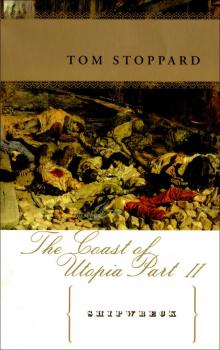 Shipwreck
Shipwreck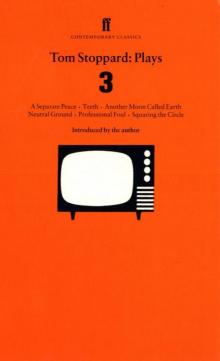 Tom Stoppard Plays 3
Tom Stoppard Plays 3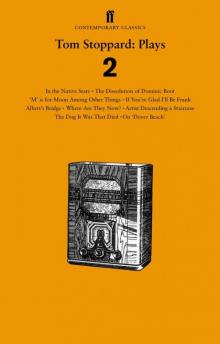 Tom Stoppard Plays 2
Tom Stoppard Plays 2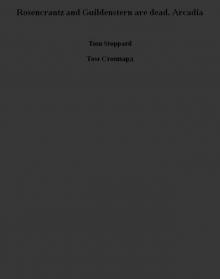 Rosencrantz and Guildenstern are dead. Arcadia
Rosencrantz and Guildenstern are dead. Arcadia